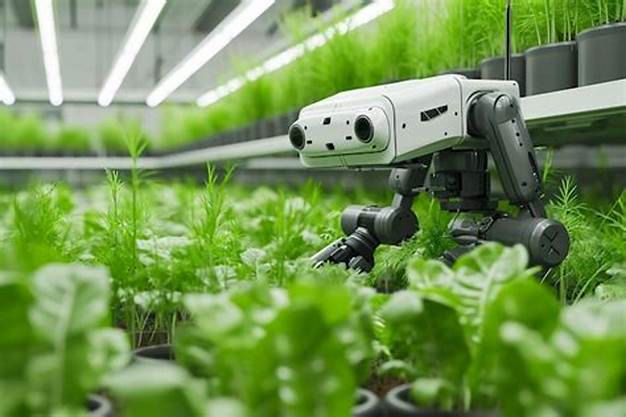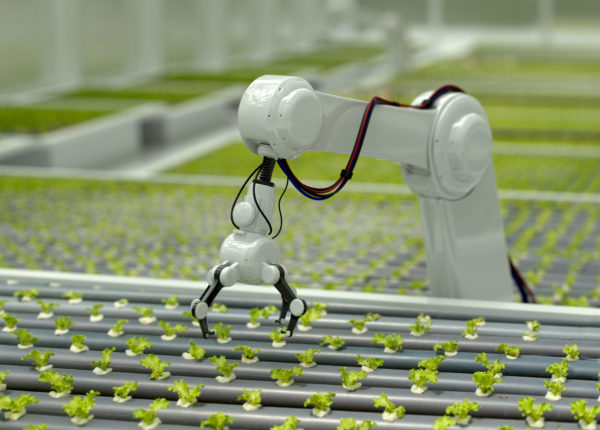Wheat is a staple crop that requires specific soil management and fertilization practices to achieve ...
कृषि में आर्टिफिशियल इंटेलिजेंस (AI) का महत्व और उपयोग लगातार बढ़ता ही जा रहा है। यह तकनीक खेती को आसान, अधिक प्रभावी, उत्पादक और सस्ती बना रही है। इस लेख में आर्टिफिशियल इंटेलिजेंस के प्रत्येक पहलू पर विस्तार से जानकारी दी गई है और यह भी बताया गया है कि इस तकनीक के द्वारा कृषि में क्या-क्या बदलाव आए हैं और कैसे यह तकनीक कृषि के लिए एक क्रांतिकारी तकनीक बनती जा रही है। आर्टिफिशियल इंटेलिजेंस (AI) को अगर साधारण भाषा में समझाया जाए तो यही वह तकनीक है जिसकी वजह से प्रत्येक क्षेत्र का काम सुविधाजनक और सटीकता से किया जा सकता है, जिसमें से एक बहुत प्रसिद्ध क्षेत्र कृषि भी है जिस पर भारत की लगभग 60% जनसंख्या प्रत्यक्ष रूप से निर्भर करती है। AI का उपयोग विभिन्न प्रकार की कृषि गतिविधियों में होता है।
अमेरिका, नीदरलैंड और इजराइल जैसे विकसित देशों ने AI का उपयोग करके अपनी कृषि तकनीकी में काफी सुधार किए हैं और फसलों को दोगुनी तेजी से फलीभूत किया है। जहां अमेरिका AI का उपयोग फसलों की स्थिति, मिट्टी का प्रकार, और मौसम के आधार पर फसलों की देखभाल करता है, वहीं दूसरी तरफ इजराइल भी AI के उपयोग कृषि में व्यापक स्तर पर कर रहा है, यहाँ ड्रिप इरिगेशन और AI-आधारित सॉफ़्टवेयर का उपयोग पानी की बचत और उच्च गुणवत्ता वाली फसलों के उत्पादन के लिए किया जा रहा है

AI ने कृषि क्षेत्र में बहुत सारी संभावनाओं को जागृत किया है इसके उपयोग से विश्व के बहुत से किसान उपज समय पर लेने के साथ – साथ, गलत दिशा में लागत लगाने से भी बच रहे हैं तथा किसान अपने आय को भी बढ़ाने में सफल रहे है। यह तकनीक खेती को आधुनिक बनाने के साथ-साथ जलवायु परिवर्तन से निपटने में भी मदद कर रही है, हालाँकि इसमें कुछ चुनौतियां भी हैं जैसे AI तकनीक में आने वाली लागत और ज्ञान की कमी जिसकी वजह से छोटे किसान इसके तकनीक से अभी दूर है, वर्तमान में इन तकनीकी का उपयोग देखते हुए ऐसा लग रहा है कि किसानों को जल्द से जल्द इस तकनीक को अपनाना चाहिए ताकि वह समय अनुसार इस तकनीक को स्वीकृत कर फसलों की पैदावार और अपने मुनाफे को बढ़ा सके।
कृषि से संबंधित वीडियो देखने के लिए यहाँ क्लिक करें: YouTube

The importance and use of Artificial Intelligence (AI) in agriculture are continuously increasing. This technology is making farming easier, more efficient, productive, and cost-effective. In this article, we have provided detailed information on every aspect of artificial intelligence and explained how this technology is bringing significant changes to agriculture and is becoming a revolutionary tool for the sector. If explained in simple terms, Artificial Intelligence (AI) is a technology that enables tasks in every field to be carried out conveniently and with precision—one of the most prominent fields being agriculture, on which approximately 60% of India's population directly depends. AI is used in various types of agricultural activities.
Developed countries like the USA, the Netherlands, and Israel have significantly improved their agricultural techniques using AI and have accelerated crop growth to nearly double the speed. While the USA uses AI to monitor crop conditions, soil types, and weather patterns to manage crops efficiently, Israel is also utilizing AI extensively in agriculture. There, AI-based software and drip irrigation techniques are being used to conserve water and produce high-quality crops.
AI has unlocked numerous possibilities in the agricultural sector. With its use, many farmers around the world are not only harvesting crops on time but also avoiding unnecessary expenses and successfully increasing their income. This technology is not only modernizing agriculture but also helping to tackle climate change. However, some challenges remain — such as the high cost of AI technology and lack of knowledge, due to which small farmers are still distant from it. Given the current use and benefits of this technology, it seems that farmers should adopt it as soon as possible so they can keep up with the times and enhance both crop yield and profitability.
---0
0
Wheat is a staple crop that requires specific soil management and fertilization practices to achieve ...
भारत में कृषि न केवल एक प्रमुख आर्थिक � ...
Neem cake is an organic byproduct derived from cold-pressed neem seeds after the extraction of neem ...
खरीफ फसलें-मानसून के मौसम में उगाई जात ...
Rice farming requires careful management of soil nutrients to ensure optimal growth and yield. The a ...
Fertilizers are essential substances used in agriculture to enhance the growth and productivity of c ...
Mango farming is a significant agricultural practice in many tropical and subtropical regions. Known ...
Organic farming is an agricultural practice that focuses on growing crops and raising livestock in a ...
Crop rotation, a key agricultural practice, involves growing different crops in the same field acros ...
Soil fertility is crucial for any farmer or gardening enthusiast. Fertile soil promotes healthy plan ...
Soil testing is a process that provides farmers with crucial information about the quality, nutrient ...
The tradition of farming in India is centuries old, and wheat and barley hold significant importance ...
The Aak plant (Calotropis gigantea) is a remarkable creation of nature, valued for its distinctive f ...
Roses, known for their beauty and enchanting fragrance, are the pride of every garden. However, main ...
Agricultural Pollution refers to the harmful effects caused by agricultural activities on the enviro ...
Temperature fluctuations have a direct impact on wheat farming. It affects sowing, growth, grain for ...
During summer, rising temperatures increase the risk of fire in wheat crops. As April begins, wheat ...
Agroforestry is a term derived from two words: "Agriculture" and "Forestry." It is a land-use system ...
Contour Farming is a very common farming technique practiced in India. It is commonly practiced in h ...
Vegetables to Sow in May : Dear farmer friends, in the month of May, our plants don't usually suff ...
Papaya is a highly nutritious fruit loaded with medicinal properties. Its consumption helps regula ...
India is an agrarian country with three major agricultural seasons and a variety of crops being prod ...
Leaf curl disease, which causes leaves to curl, is a serious threat to agriculture. This disease aff ...
Intercropping is a farming method where two or more crops are grown together in the same field. It h ...
Mulching is a layer spread over the surface of the soil, primarily aimed at retaining soil moistur ...
India is an agriculture-based country, yet many farmers can’t use their land as it remains barren ...